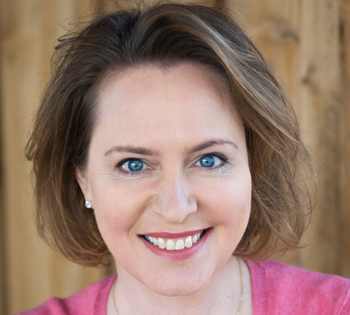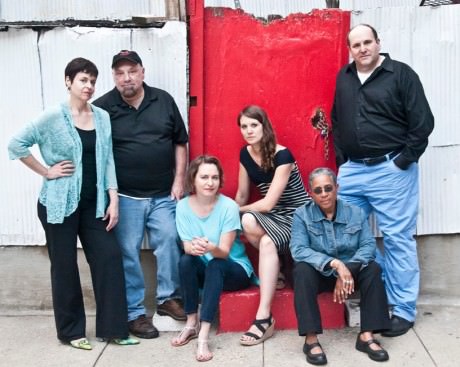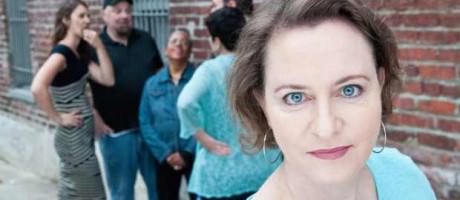Welcome back to the new Playwright interview series –The Playwright’s Playground – a monthly in-depth conversation with a local female playwright in the D.C. theatre community. Female theatre artists make up more than 50 percent of those involved in the theatre, yet the number of female playwrights being produced is dramatically lower.
In this continuing Series, I will interview and introduce DCMTA readers to the many talented playwrights in the DMV area to learn about their writing process, their inspirations, and their motivations and struggles to write and produce their art. Last month the ‘The Playwright’s Playground’ debuted with an engrossing conversation with Jacqueline Lawton ( The Hampton Years). This month it is my pleasure to share my interview with Allyson Currin, playwright of WSC Avant Bard’s latest Production, Caesar and Dada, playing at the Callan Theatre at Catholic University.
In Part I: Allyson talked freely about her love of theater and her training and playwriting process. With humor and forthrightness she discusses the development of her new play Caesar and Dada in great detail and shares inspired insight about her creative pursuit of excellence.
In Part II: Allyson defines success, discusses her struggles with the business side of Playwriting, and shares her thoughts on the state of theater today, her new playwriting group The Welders, and the best ways for audiences to support New Works and local playwrights.
ALLYSON CURRIN

It’s been a sincere pleasure learning about what inspires the gifted and multi-talented, multitasking Playwright, Allyson Currin. What is especially engaging about Allyson is just how real she is. She has an authenticity that demands respect. A straight shooter with no airs, it’s refreshing and enlightening to learn how she juggles the balancing act of her life as a single parent of twin teenage girls (her husband, Chris, passed away in 2005). You can’t help but to be charmed by her wit and intelligence.
As the author of more than twenty plays, and a two-time Helen Hayes Award Nominee (Church of the Open Mind, Amstel in Tel Aviv), Currin’s versatility as a writer means that she is not easily pigeonholed. The keen observance and verbal dexterity of her work is passionate and challenging, and the diversity and off beat humor of her plays always keeps you on your toes. In the last two years Currin has had three World Premiere productions (Caesar and Dada, Benched, Hercules in Russia.) Allyson is also an actress, and has performed on many stages in the Washington/Baltimore area. A George Washington University Professor since 1998, she is the Managing Director of GWU’s New Play Festival, and is also the Chair of the National Playwriting Program (Region 2) of The Kennedy Center’s American College Theater Festival.
When asked how do you do it? Allyson simply replied -“I don’t sleep.”
___________________
Sydney-Chanele: How do you define success?
Allyson: That is a shifting definition for me. Of course I want a Pulitzer! Of course I want to be on Broadway and in the West End! Those would be beyond-my-wildest-dreams successes, and I would never want to discount those dreams. But I am also a realist. This is an insanely difficult and competitive business, driven entirely by taste and strong personalities and the fickleness of fate.
I also define success very simply: I am a working artist. I am surrounded by talented people that believe in me. I believe in them. We do challenging work together. My plays get in front of audiences, who have been generous with them. I get to be creative all the time! I have found ways to give to other generations of artists through my teaching in the Theatre department at GWU, and through my involvement with the National Playwriting Program of the Kennedy Center’s American College Theatre Festival where I work with a TON of selfless Theatre professionals and great aspiring artists. My artistic and academic life is all about asking big questions and living in theatre and it dawns on me: I will TOTALLY take that. Not sure how I got so lucky – but thank you, Universe!
Tell me about a time when you felt like you weren’t making progress in your writing, and how you worked through it.
I didn’t write a single word the entire time I was pregnant. That was scary. I’ve had long periods of writer’s block at various times in my life. They used to scare the crap out of me, but I’ve learned to live with them. I need empty time to refill myself creatively, to discover new ideas. There are so many ways to be creative too – seeing Theatre, teaching, reading. Those are all activities that satisfy the same impulse as writing, so I let them take over sometimes. Hemingway has a quote that I don’t take literally, as he did (wouldn’t be good for the liver!) but I do let it inspire me metaphorically: “Write drunk. Edit sober.” What I used to call “writer’s block,” I now try to think of as my periods of “editing sober.” You can’t be in creative mode all the time. You need to give yourself time for reflection, absorption and rest.
What is the favorite among your plays? Why? Has that “favorite” been the most critically acclaimed and successful?
That is seriously like asking me to pick a favorite child. Toni Morrison had the best response to this question when she answered that her favorite piece was “the one I’m working on now.” That’s so true.
But okay. Caesar and Dada is waaaay up there – may be my all-time favorite. And it has done very well critically so far. I adore Love and Whiskey, which has only had a workshop and has not premiered. I really want Love and Whiskey to have its premiere. It’s a beautiful story, really, based on the diary my grandmother kept during the Depression. It’s audience-tested (successfully) and ready to go – No idea why it hasn’t premiered.
I have soft spots for Church of the Open Mind (my 2nd Helen Hayes nomination) and Learning Curves – I wrote the two of them at the same time and they premiered in the same year. I love The Dancing Princesses (with wonderful composer-lyricist Chris Youstra). Those last three all had successful premieres. And, without naming the whole Currin oeuvre, I also adore the play I’m working on right now for Signature Theatre, with my fabulous Matt Conner as composer-lyricist. I would love another stab at Hercules in Russia, which I think is an important story. I’m already in love with my new (1st draft only) play for Locally Grown, The Return to Latin. Hell, I love them all!
What frustrates you most about your profession and the business side of playwriting?
The more apt question would be what DOESN’T frustrate me about the business side of playwriting? I just like to do the work, and the work takes soooo much time and emotional effort. To market it (this is a common complaint amongst playwrights, I’m not saying anything revolutionary here) is a full-time job on top of my already-full-time jobs of parenting, writing and making a living.
Good news though – I have recently come together with four other playwrights (Bob Barlett, Renee Calarco, Caleen Sinnette Jennings, and Gwydion Suilebhan) and a dramaturg/creative executive Jojo Ruff to form a group called The Welders. Our goal is to bypass existing institutional impediments for playwrights and produce one another’s work as a collective. Google us! And, after we have founded this organization and produced one play per playwright, we will hand off the whole shebang to another group of playwrights. That kind of assertion of control by playwrights is very empowering.

And, in addition to The Welders, I have done more self-producing and promoting in DC and NYC. It feels good to take control, at least in small ways.
According to your website, you have three plays in development. Describe those projects and any others that you are currently working on.
* A new musical for Signature with Matt Conner – a Tennessee funeral home musical!
* Locally Grown – The Return to Latin – a comedy/tragedy about women aging.
Several new plays for friends…
* The Redneck Grail which The Welders will be producing in 2014 – exactly what it sounds like, a grail quest for a redneck – an Alice-down-the-rabbit-hole look at city life from the perspective of a country girl, inspired by one of my disastrous endless trips to the DC DMV. (I’m sure my website isn’t up to date at the moment).
What is the five-year plan for your career and playwriting goals?
I want to raise my profile nationally. I want to be bigger on the regional scene. And I’m actually working on three projects that might do that! Fingers crossed.
How active is the pursuit of acting roles for you today? What is it about directing that intrigues you or intimidates you?
I stopped directing years ago. I had to make some choices about what to jettison once playwriting took off (and I had kids, too) and directing had just stopped satisfying me. With regards to acting, I’ve also backed off in recent years, mostly because it’s hard on my kids for me to be involved in a rehearsal process. My daughters are older now, and are expressing an interest in seeing me on stage again, so if the work comes, I will definitely try to make room for it. Only if it’s a good part, though – I’ve paid my dues and don’t have time for unchallenging work anymore.
Shifting gears here, let talk about your thoughts on regional theatres’ support of producing new theatre and local playwrights? How receptive do you think DC theatres are to programming new works and local playwrights into their seasons – or is it still perceived as too much of a financial risk?
Well, it’s a better situation than it used to be but it’s still a struggle. The major player-shift in the new play landscape, to my mind anyway, is the audience. Audiences are so much more generous and receptive to new work than they were when I first started out. They are respectful of the process, and genuinely curious about the product. In my experience, the audience will come.
Theatres? The conversation on this issue in DC is lively and important. Area artistic directors understand the challenges of producing new work, and the financial risks are real. But I’m so close to the issue emotionally that I’m not sure I can speak usefully here I have had great, productive and impassioned conversations with theatre people all over this city. Everyone WANTS to be supportive of new work, no question.
You are one of the Resident Playwrights in Theatre J’s 2013 “Locally Grown” Initiative. How has that type of support nurtured you as a Playwright?
Such a cool program, one with real meat to it. It is a program that puts its money where its mouth is. It is essential that high profile theatres take the initiative on hard-core new play development like Theatre J has (led by playwright and Artistic Director Ari Roth). I say “essential” because Locally Grown isn’t a lip-service reading series. It is results-oriented and serious. It generates a lot of attention and buzz for the playwrights, and is an incredibly exciting program. I felt very well-served and cherished during my part of the process and I am honored.
How can DC audiences best support new works and local playwrights?
DC audiences are awesome. For support, audiences should reserve all of their donation money for theatres that do new work. I refuse to give a penny to theatres that don’t produce the work of local playwrights, and I give as generously as I can to those that do. Look for theatres that support new work in their mission statements or have a track record of producing new work, and not just the new stuff out of NYC: 1st Draft Reading Series, The Inkwell, Theatre J, Rorschach, Pinky Swear, Imagination Stage, The Kennedy Center’s Theatre for Young Audiences, Signature, and WSC Avant Bard.
If audiences want new work in DC, they should let their donations talk.
Do you read theater reviews during the run of your production? How important or relevant are reviews for a Playwright today?
I read reviews and I keep every single one of them in a book: the good, the bad and the ugly. If you read the good, you have to read the bad too. It is an essential lesson in humility. Reviews are a part of the process, and a playwright needs to learn to take the heat. I got panned a couple of times, and it always hurts. But what I do is public by nature, which means I don’t get to pick who to listen to once my work out there.
What I DISLIKE PASSIONATELY is what the internet world has made available in a big way: anonymous posting. As a person who stands by her words as a way of life, I resent that people can speak out in any way, for or against, a public artist, without owning THEIR words. In the words of Peter Marks, an anonymous posting is not a contribution: “It’s graffiti.”
I mean, what’re you going to do…? Consider the source, know yourself, trust yourself and use only what is useful to you.
Why do you go to the theater?
I have been doing theatre for so long that now I only go if I have a compelling personal connection – a playwright friend, an actor friend, a need to support smaller companies. I prefer the work that smaller companies are doing. I find that to be the hungrier and more essential work.
How do you view the state of American theater today, and your role in it?
Theatre is, was, and always has been grass-roots. This is a real attribute and I think communities are embracing that. The regional theatre scene has exploded in the past fifty years. This means that theatre is increasingly perceived as immediate and relevant to its community. This is awesome! I love that the focus is moving away from NYC as the center of the theatrical universe. Theatre should speak to its audience and the idea that taste-makers from elsewhere dictate our theatrical fare nation-wide seems wrong to me. I think theatre nationally is embracing this notion.
I just hope I keep working in theatre, and continue to write as well as I have been. I think I have a powerful voice as a writer. I hope to keep exercising it with skill. Simple, really.
____________________

LINKS:
‘The Playwright’s Playground’ Series: Allyson Currin Part 1 by Sydney-Chanele Dawkins.
Allyson Currin’s website.
The Welders’ website.
Caesar and Dada plays through July 14, 2013, at WSC Avant Bard at Catholic University of America’s Callan Theatre – 3801 Harewood Road, NE, in Washington, D.C. For tickets, call the box office at 703-418-4808, purchase them online, or make reservations by e-mail: [email protected].




